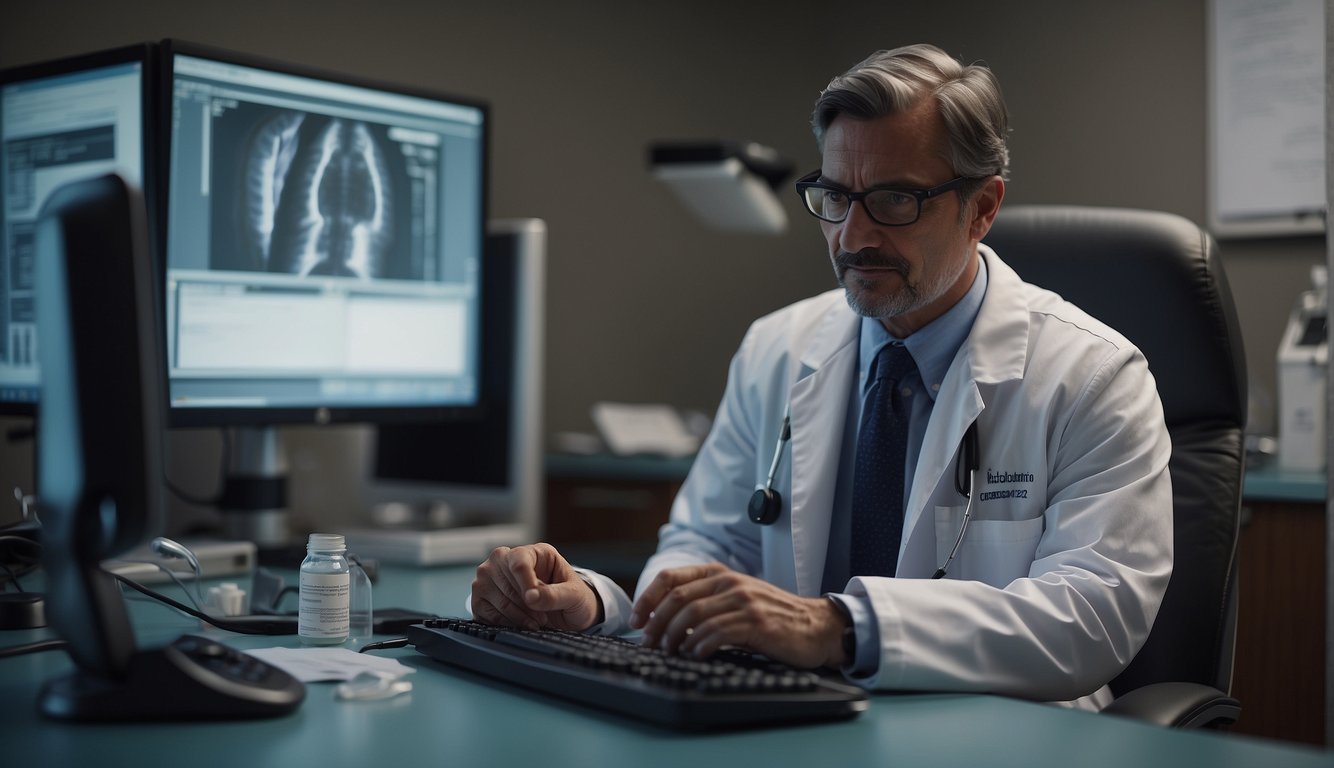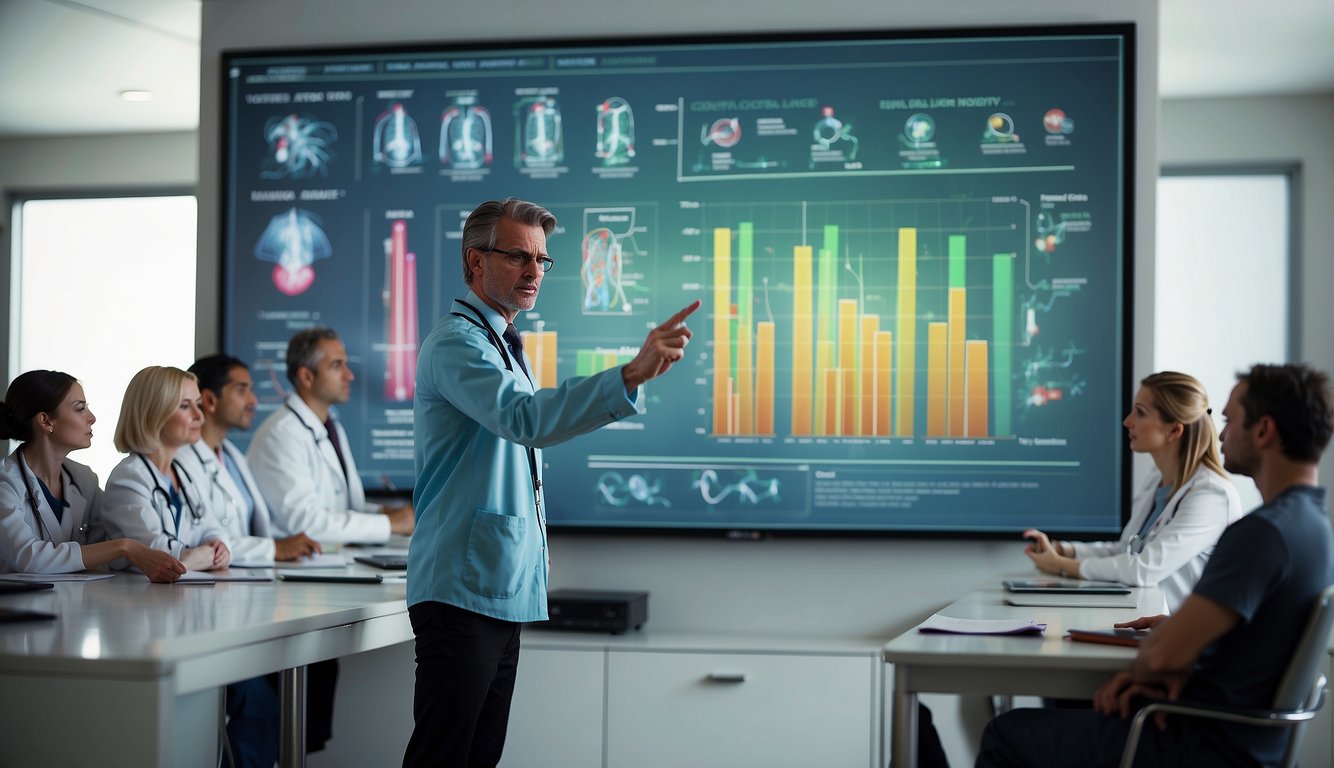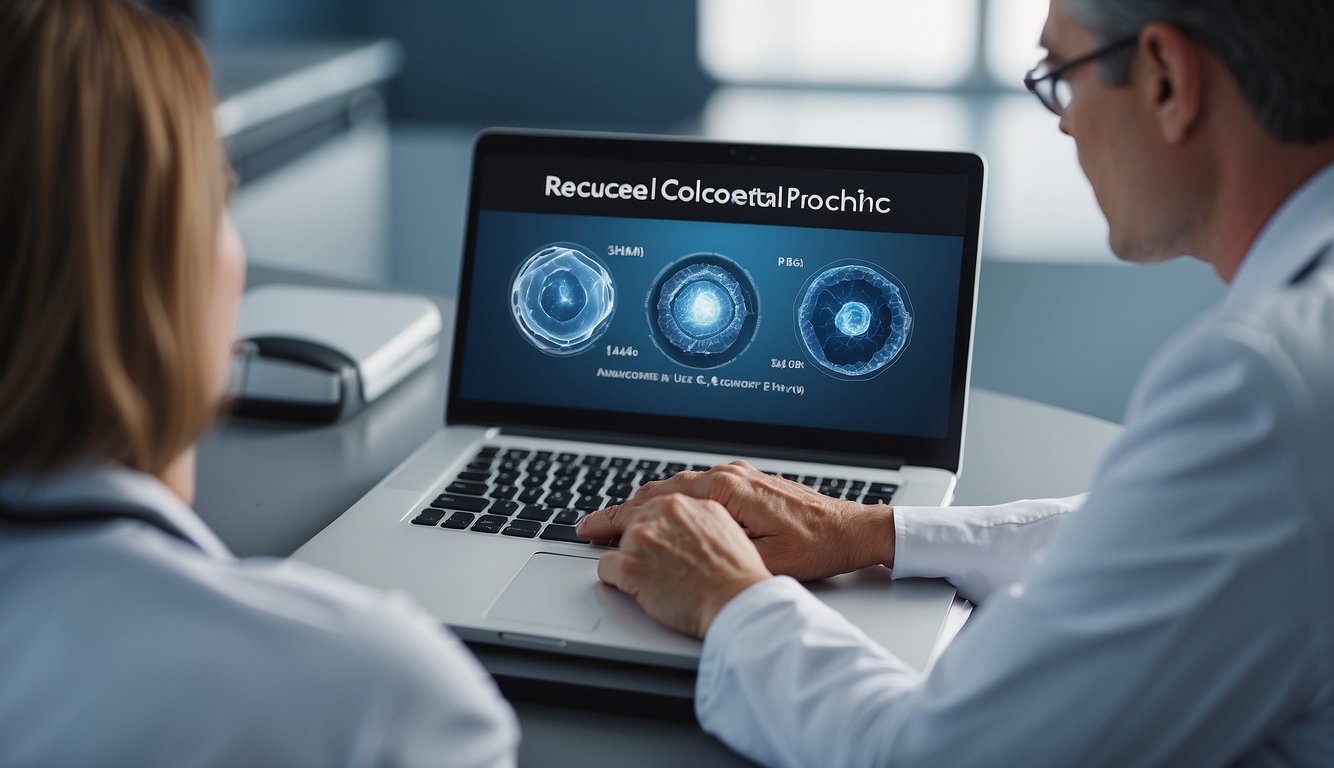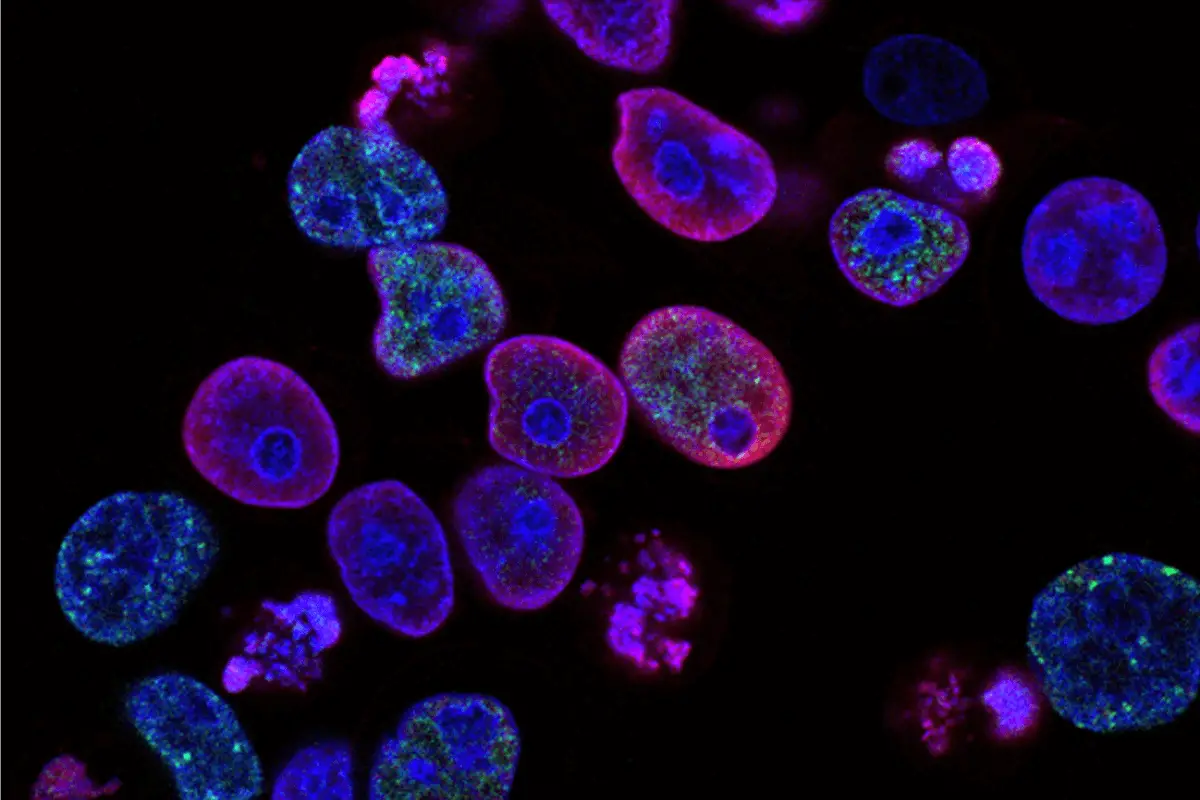TheHerbProf.com is a treasure trove of knowledge for those interested in natural healing and herbal remedies. The website is run by Paul Johnston MD. A naturopathic who has not only received extensive education in the field but also has personal experience in self-healing.
Colorectal cancer is a type of cancer that affects the colon and rectum. It is the third most common cancer in the United States, with over 100,000 new cases diagnosed each year. While it can be a serious and life-threatening disease, early detection and treatment can greatly improve a patient’s chances of survival. In this article, I will discuss the symptoms of colorectal cancer and what to look out for.

The symptoms of colorectal cancer can vary depending on the location and size of the tumor. Some common symptoms include changes in bowel habits, such as diarrhea or constipation, rectal bleeding or blood in the stool, abdominal pain or cramping, and unexplained weight loss. It is important to note that these symptoms can also be caused by other conditions, so it is important to consult with a doctor if you experience any of them.
If you are experiencing any of these symptoms, it is important to speak with your doctor as soon as possible. Early detection and treatment can greatly increase your chances of survival. In the next section, we will discuss the specific symptoms of colon and rectal cancer in more detail.
Understanding Colorectal Cancer
As someone who has researched colorectal cancer, I understand the importance of knowing the symptoms, causes, and risk factors associated with this disease. In this section, I will provide a brief overview of colorectal cancer, including its definition, types, causes, and risk factors.
Definition and Types
Colorectal cancer is a type of cancer that affects the colon and rectum, which are parts of the large intestine. The colon is the first four to five feet of the large intestine, while the rectum is the last six inches. Colorectal cancer can develop in either the colon or rectum, and it usually begins as a growth called a polyp. There are two main types of colorectal cancer: colon cancer and rectal cancer. Colon cancer develops in the colon, while rectal cancer develops in the rectum.
Causes and Risk Factors
The exact cause of colorectal cancer is unknown, but there are several factors that can increase your risk of developing the disease. Age is a major risk factor, as most cases of colorectal cancer are diagnosed in people over the age of 50. Family history of colorectal cancer or polyps can also increase your risk, as can having a personal history of polyps or inflammatory bowel disease.
Other risk factors for colorectal cancer include obesity, smoking, and heavy alcohol consumption. Obesity can increase your risk of developing colorectal cancer by up to 30%, while smoking can increase your risk by up to 40%. Heavy alcohol consumption can also increase your risk of developing colorectal cancer, especially if you are a heavy drinker for a long period of time.
Understanding the definition, types, causes, and risk factors of colorectal cancer is essential for early detection and prevention of this disease. By knowing the signs and symptoms of colorectal cancer, you can take steps to reduce your risk and increase your chances of a successful treatment outcome.
Common Symptoms of Colorectal Cancer

Colorectal cancer is a type of cancer that affects the colon and rectum. It is important to be aware of the symptoms of colorectal cancer, as early detection can improve the chances of successful treatment. Here are some of the most common symptoms of colorectal cancer:
Changes in Bowel Habits
One of the earliest signs of colorectal cancer is a change in bowel habits. This can include constipation or diarrhea that lasts for more than a few days, or a feeling that the bowel does not empty completely after a bowel movement. You may notice a narrowing of the stool, or that your stool is thinner than usual. These changes in bowel habits can be a sign that there is a blockage in the colon or rectum.
Blood in Stool and Rectal Bleeding
Blood in the stool or rectal bleeding can be a sign of colorectal cancer. This can be bright red blood that is visible on the toilet paper or in the toilet bowl, or dark, tarry stools that have a foul odor. If you notice any blood in your stool or rectal bleeding, it is important to see a doctor right away.
Abdominal Discomfort and Bloating
Abdominal discomfort, bloating, and cramps can also be symptoms of colorectal cancer. You may feel a constant ache or pain in your abdomen, or you may experience sharp, stabbing pains that come and go. Bloating can also be a sign of colorectal cancer, as the tumor can cause a blockage in the colon or rectum.
Systemic Symptoms
In addition to the symptoms listed above, colorectal cancer can also cause systemic symptoms such as fatigue, weakness, and unexplained weight loss. You may feel tired all the time, even if you are getting enough sleep, or you may notice that you are losing weight without trying. These symptoms can be a sign that the cancer has spread to other parts of the body.
It is important to remember that these symptoms can be caused by many different conditions, and having one or more of these symptoms does not necessarily mean that you have colorectal cancer. However, if you are experiencing any of these symptoms, it is important to see a doctor as soon as possible to determine the cause and receive appropriate treatment.
Diagnosis and Screening

As with most cancers, early detection is key to successful treatment of colorectal cancer. Diagnosis and screening are important steps in identifying the disease and determining the best course of treatment.
Screening Methods
The American Cancer Society recommends regular screenings for individuals at average risk of developing colorectal cancer starting at age 45. Screening methods include stool-based tests, such as the fecal immunochemical test (FIT) and the guaiac-based fecal occult blood test (gFOBT), and visual exams, such as colonoscopy and sigmoidoscopy.
During a colonoscopy, a doctor uses a long, flexible tube with a camera to examine the entire colon and rectum for polyps or other abnormalities. A sigmoidoscopy is similar, but only examines the lower part of the colon. Both procedures require preparation beforehand and may be performed under sedation.
Diagnostic Tests
If symptoms are present or abnormalities are detected during screening, further diagnostic tests may be necessary. A doctor may perform a physical exam and review the patient’s medical history. Imaging tests such as a CT scan or ultrasound may be used to visualize the colon and surrounding tissues.
A biopsy may be necessary to confirm a diagnosis of colorectal cancer. During a biopsy, a small sample of tissue is removed and examined under a microscope for cancerous cells.
It is important for individuals to discuss their risk factors and screening options with their doctor and schedule regular appointments for screenings as recommended by the American Cancer Society.
Treatment Options – Symptoms for Colorectal Cancer

If you are diagnosed with colorectal cancer, your doctor will discuss with you the best treatment options based on your individual situation. Treatment options for colorectal cancer include surgical procedures, chemotherapy and radiation, targeted therapy, and immunotherapy.
Surgical Procedures – Symptoms for Colorectal Cancer
Surgery is often the first treatment option for colorectal cancer. The goal of surgery is to remove the cancerous tumor and any surrounding tissue that may contain cancer cells. There are several types of surgical procedures, including:
- Polypectomy: For small polyps, a doctor may remove them during a colonoscopy.
- Local excision: For early-stage rectal cancer, a doctor may remove the cancerous tissue and a small amount of surrounding tissue.
- Resection: For more advanced cancer, a surgeon may remove a portion of the colon or rectum, along with nearby lymph nodes.
Chemotherapy and Radiation
Chemotherapy and radiation therapy are often used in combination with surgery to treat colorectal cancer. Chemotherapy uses drugs to destroy cancer cells, while radiation therapy uses high-energy radiation to kill cancer cells. These treatments may be given before or after surgery, depending on the stage and location of the cancer.
Targeted Therapy and Immunotherapy
Targeted therapy and immunotherapy are newer treatments for colorectal cancer. Targeted therapy uses drugs that target specific proteins or genes that are involved in the growth and spread of cancer cells. Immunotherapy helps the body’s immune system fight cancer cells. These treatments may be used in combination with chemotherapy and radiation therapy, or on their own for advanced-stage cancer.
It is important to discuss all treatment options with your doctor to determine the best course of action for your individual situation.
Managing Symptoms and Side Effects – Symptoms for Colorectal Cancer

As someone who has been diagnosed with colorectal cancer, it is important to manage the symptoms and side effects that come with the disease. Here are some ways to manage common symptoms and side effects of colorectal cancer.
Pain Management
Pain is a common symptom of colorectal cancer. It can be managed through medication, such as over-the-counter pain relievers like acetaminophen or ibuprofen, or prescription pain medication. It is important to talk to your doctor about the best pain management plan for you.
Dietary Adjustments – Symptoms for Colorectal Cancer
Dietary adjustments can help manage symptoms and side effects of colorectal cancer. Eating a healthy diet rich in fruits and vegetables can help manage fatigue and appetite issues. It is important to avoid processed foods, sugary drinks, and alcohol, which can cause weight gain and exacerbate symptoms.
Lifestyle Changes
Lifestyle changes can also help manage symptoms and side effects of colorectal cancer. Quitting smoking can help manage aches and pains, while reducing alcohol consumption can help manage fatigue and weight loss. It is important to talk to your doctor about the best lifestyle changes for you.
Managing symptoms and side effects of colorectal cancer is important for overall health and well-being. By managing pain, making dietary adjustments, and making lifestyle changes, you can improve your quality of life and better manage the disease.
Protein – Symptoms for Colorectal Cancer
The first thought that entered my mind was, how will I get my protein? The answer is simple, protein is everywhere; it is in produce, grains, and legumes. In fact, some of the largest and most powerful animals on the planet get their protein from these sources. You cannot avoid protein. In truth, Americans eat far too much protein. It is one of our biggest health problems. Furthermore, the healthiest segment of our population is the vegetarians. But take hope, you only have to eliminate animal products until the cancer is gone.
Water – Symptoms for Colorectal Cancer
Water must be the purest. Most Americans think that bottled water is the purest you can drink. Actually, my friends, it is not. On a microscopic level, where the cells of your body live, the minerals are like rocks and difficult to deal with. The purest water you can drink is distilled water. Distilled water is like a vacuum in your body helping to clean out toxins. There are some who say that distilled water leaches out minerals from your body and teeth. Well, actually if you added up all the minerals expelled from the body by distilled water it would add up to the amount of minerals in 2 almonds. I myself know of a chiropractor who drank distilled water all her life with no ill effects. You really wonder where these rumors come from.
Air must be pure. Yes, environmentally we have a real problem here. Those of you who can move to the mountains while fighting this disease are fortunate. But, there is an answer for those who cannot. It is called Kapalabhati, a yoga breathing technique that purges your lungs of toxins and oxygenates your brain. Here is all the info you need to know about it:

Kapalabhati
Why do it?
Kapalabhati is an incredibly energizing breath – better than coffee during a break. It strengthens the abdominal muscles, the diaphragm, and the heart. It massages the viscera (internal organs), stimulating digestion and elimination. Removes stale air and toxins from the lungs, cleansing the body. Energizes and massages the central nervous system, increasing energy, clarity, and alertness. The CSF (Cranio-Sacral Fluid) is being pumped more energetically around your brain, thus aka “polishing your skull” and promoting clarity of thought.
What is happening?
The rapid and forceful exhalation and pumping of the abdomen and diaphragm are stimulating circulation, increasing the circulation in your body. The heart muscles are being stimulated with the squeezing, contracting movement and then the relaxation of the abdomen. This creates a “pumping” motion around the heart, stimulating circulation all the way up to your brain and skull (hence the name “skull polishing breath”). The pumping motion of the belly deeply massages and stimulates your internal organs, increasing health and energy levels. CSF (Cranio-Sacral Fluid, also known as cerebral-spinal fluid, found in the spinal column and surrounding the brain) changes pressure according to the natural respiratory rhythm. The sharp expulsions and rapid pace of Kapalabhati cause a tremendous shift in the pressure, causing the CSF to flow more rapidly, and be circulated around the brain – massaging the brain and enlivening every cell.
How to Practice:
- Sit firmly in a cross-legged posture with the spine, neck, and head held erect.
- First, exhale completely and then take a few deep breaths.
- Relax the abdominal muscles.
- Inhale without taking a deep breath; make a short and forceful expulsion of the breath through both nostrils producing a hissing sound and, simultaneously, contract the lower abdomen by a rapid and vigorous thrust of the abdominal muscles.
- Release the contraction of the abdominal muscles quickly and the lungs will automatically take in air. Follow at once by another forcible expulsion of your breath, contracting the abdomen in the same manner and letting it relax outward as the air is drawn in again.
- Repeat the exercise a number of times in quick succession, concentrating your mind on the region of the abdomen below the navel.
- After you complete a round and make the last exhalation, take in a deep and slow breath and then resume normal breathing to afford rest to the lungs.
- As you are learning, practice a round of 15 to 25 repetitions. Gradually, over time, progress to 50 reps then 75, perhaps to 120 reps per round should be the maximum. If you feel winded, slow down to allow yourself more time to inhale.
- Perform three rounds in each sitting, with sufficient pause between the rounds, when normal breathing should be done.
Precautions:
– If you feel dizzy or light-headed stop for a few minutes then resume. Perhaps spend shorter amounts of time practicing this breath.
– If you have high blood pressure, check with a doctor
Contraindications:
– Pregnancy
– Recent surgery
Prevention and Early Detection – Symptoms for Colorectal Cancer

Colorectal cancer is a highly preventable and treatable disease if detected early. As such, it is important to take steps to reduce your risk of developing the disease and to undergo regular screenings and check-ups to catch it early if it does develop.
Lifestyle and Diet – Symptoms for Colorectal Cancer
Several lifestyle and dietary factors can increase your risk of developing colorectal cancer. Maintaining a healthy weight and avoiding obesity is one important step you can take to reduce your risk. Regular exercise can also help to reduce your risk.
Dietary factors also play a role. Eating a diet rich in fruits and vegetables can help to reduce your risk of developing colorectal cancer. On the other hand, consuming a diet high in red and processed meats, alcohol, and smoking can increase your risk.
I managed to cure my prostate cancer with naturopathic medical techniques. Click in the link to find out more!
Regular Screenings and Check-ups
Regular screenings and check-ups are essential for early detection of colorectal cancer. The American Cancer Society recommends that people at average risk of developing the disease begin regular screenings at age 45.
Screening methods include stool tests, colonoscopies, and other imaging tests. The specific screening method used will depend on your individual risk factors and health history.
By taking steps to reduce your risk of developing colorectal cancer and undergoing regular screenings and check-ups, you can help to ensure that any potential cancer is caught early and treated effectively.
Support and Resources – Symptoms for Colorectal Cancer

As a patient with colorectal cancer, it is important to have a support system to help you navigate through the challenges of treatment and recovery. There are many resources available to help you along the way. Here are some of the resources that I have found to be helpful:
Patient Support Groups – Symptoms for Colorectal Cancer
Joining a support group can provide you with emotional support and a sense of community. The American Cancer Society offers a variety of support groups for patients with colorectal cancer, as well as their caregivers and family members. These groups are a great way to connect with others who are going through similar experiences and to share information and advice.
Educational Materials
The American Cancer Society provides a wealth of educational materials on colorectal cancer, including information on treatment options, screening guidelines, and coping with side effects. These materials can help you better understand your diagnosis and treatment plan, and can also help you make informed decisions about your care.
Your doctor can also be a valuable resource for information and support. They can answer any questions you may have about your treatment plan and can provide guidance on managing side effects. It is important to keep an open line of communication with your doctor throughout your treatment.
In addition to these resources, there are many other organizations and support groups available to help patients with colorectal cancer. By taking advantage of these resources, you can build a strong support system and improve your overall quality of life.
Cancer and The Herb Prof: A Healing Harmony
Let’s delve into the world of Cancer, a health condition that affects many people, and its unique synergy with our website, theherbprof.com.
Cancer is a complex disease that requires comprehensive care and management. But don’t lose hope! Nature has provided us with herbs that can support overall health and wellbeing during this journey. It’s like a comforting balm for your body!
But how does this tie into theherbprof.com? Well, we’re all about sharing the wisdom of herbs. And Cancer? It’s one of the health concerns we aim to address!
We’re a perfect pair, really. Theherbprof.com provides the platform, and Cancer is one of the topics we cover. We highlight the herbs that can support health during cancer treatment, and it brings a wealth of information to our readers.
So, when you’re exploring theherbprof.com, make sure to visit our Cancer section. It’s a dynamic duo you won’t want to miss! And remember, laughter is the best medicine, but a little herbal knowledge might just be the perfect sidekick!
References:
Little Herb Encyclopedia, by Jack Ritchason; N.D., Woodland Publishing Incorporated, 1995
The Ultimate Healing System, Course Manual, Copyright 1985, Don Lepore
Planetary Herbology, Michael Tierra, C.A., N.D., Lotus Press, 1988
Handbook of Medicinal Herbs, by James A. Duke, Pub. CRP Second Edition 2007
The Complete Medicinal Herbal, by Penelope Ody, Published by Dorling Kindersley
Before You Go – Check the Following Articles!
Check these Categories:
Frequently Asked Questions – Symptoms for Colorectal Cancer

What are the early warning signs of colon cancer?
Colon cancer may not show any symptoms in the early stages. However, some early warning signs may include:
- A change in bowel habits, such as more frequent diarrhea or constipation
- Rectal bleeding or blood in the stool
- Ongoing discomfort in the belly area, such as cramps, gas or pain
- A feeling that the bowel doesn’t empty all the way during a bowel movement
- Weakness or tiredness
What symptoms might indicate stage 1 colon cancer?
In stage 1 colon cancer, the tumor is still small and has not spread to the lymph nodes or other organs. Symptoms may not be present, but some people may experience:
- Blood in the stool
- Abdominal pain or discomfort
- Changes in bowel habits
How can colon cancer present differently in women?
Colon cancer can present differently in women than in men. Women may experience symptoms such as:
- Abdominal pain or discomfort
- Changes in bowel habits
- Fatigue
- Iron deficiency anemia
- Pelvic pain or discomfort
- Unexplained weight loss
What are the advanced symptoms of colorectal cancer?
As colorectal cancer advances, symptoms may include:
- Anemia
- Blood in the stool
- Bowel obstruction
- Changes in bowel habits
- Fatigue
- Unexplained weight loss
Can colon cancer be asymptomatic, and if so, for how long?
Yes, colon cancer can be asymptomatic, especially in the early stages. It can take several years for colon cancer to develop from small polyps to cancerous tumors. Therefore, regular screening is important to detect colon cancer early.
What symptoms are typically experienced in the final stages of colon cancer?
In the final stages of colon cancer, symptoms may include:
- Difficulty breathing
- Severe pain
- Severe weakness
- Unintentional weight loss
- Yellowing of the skin and eyes (jaundice)
It’s important to note that symptoms vary from person to person, and some people may not experience any symptoms at all. If you have concerns about your risk for colon cancer or are experiencing any symptoms, talk to your doctor.


